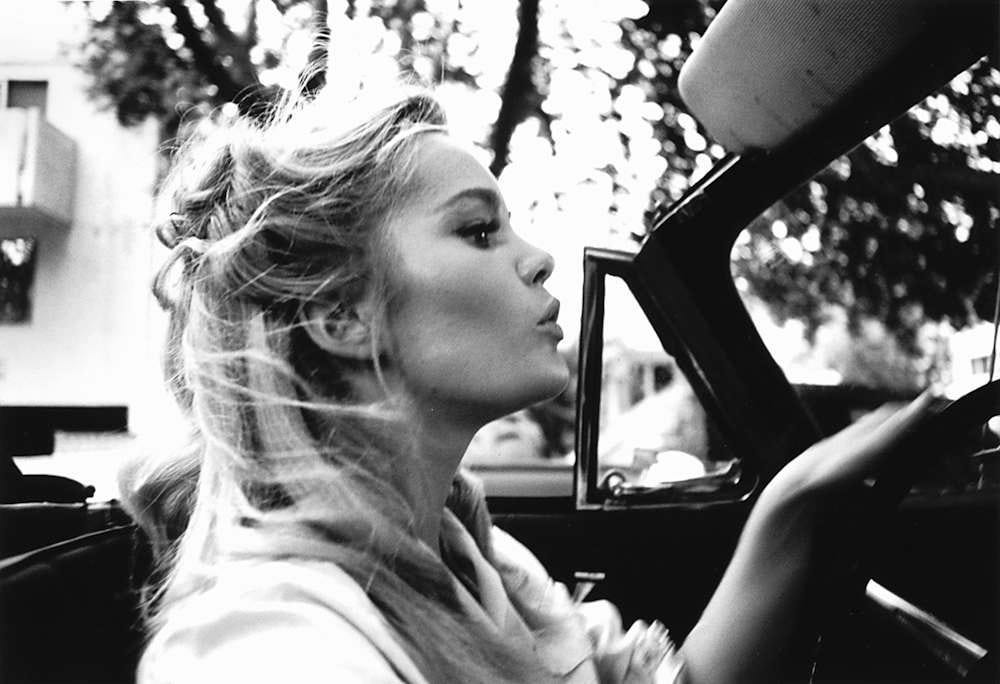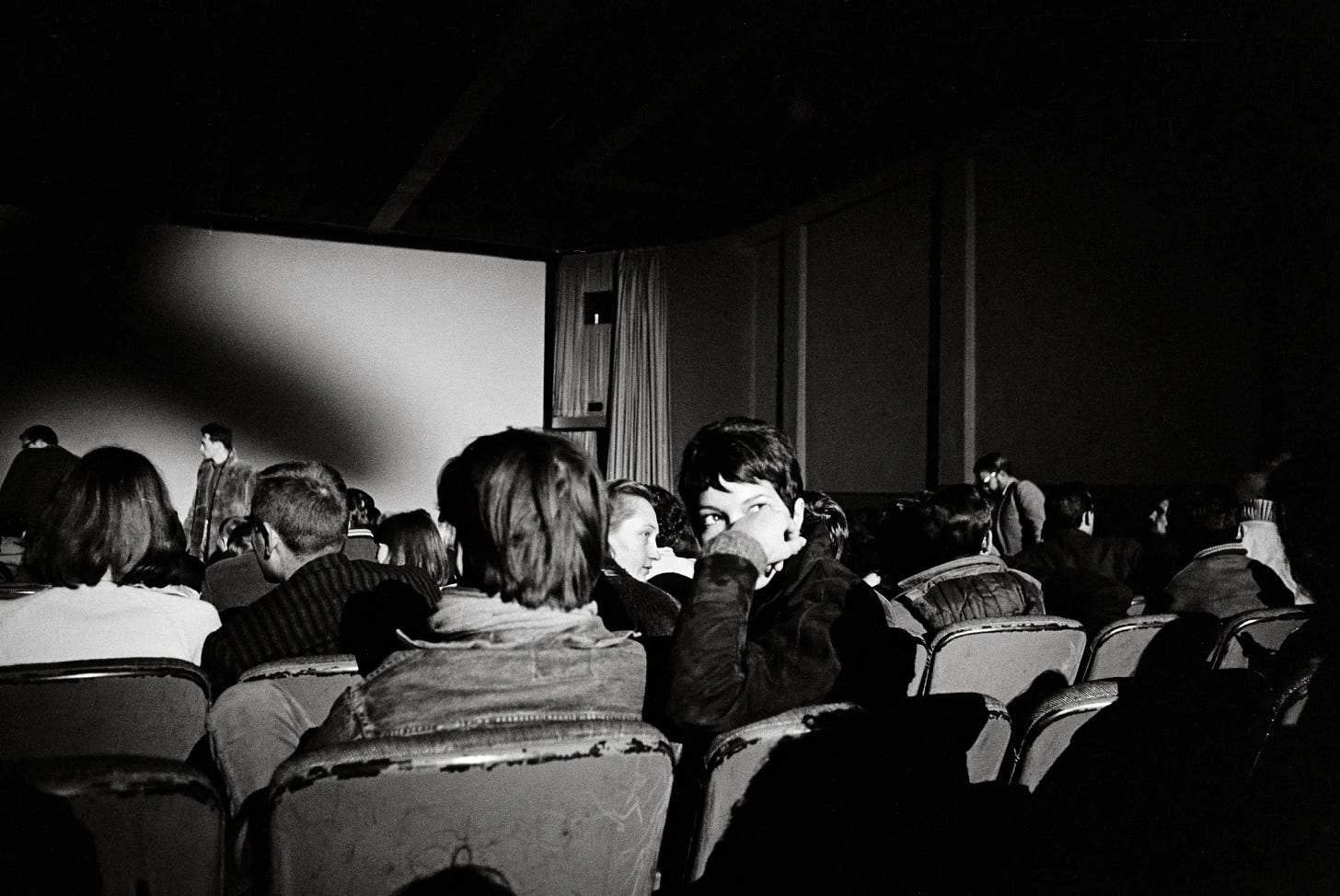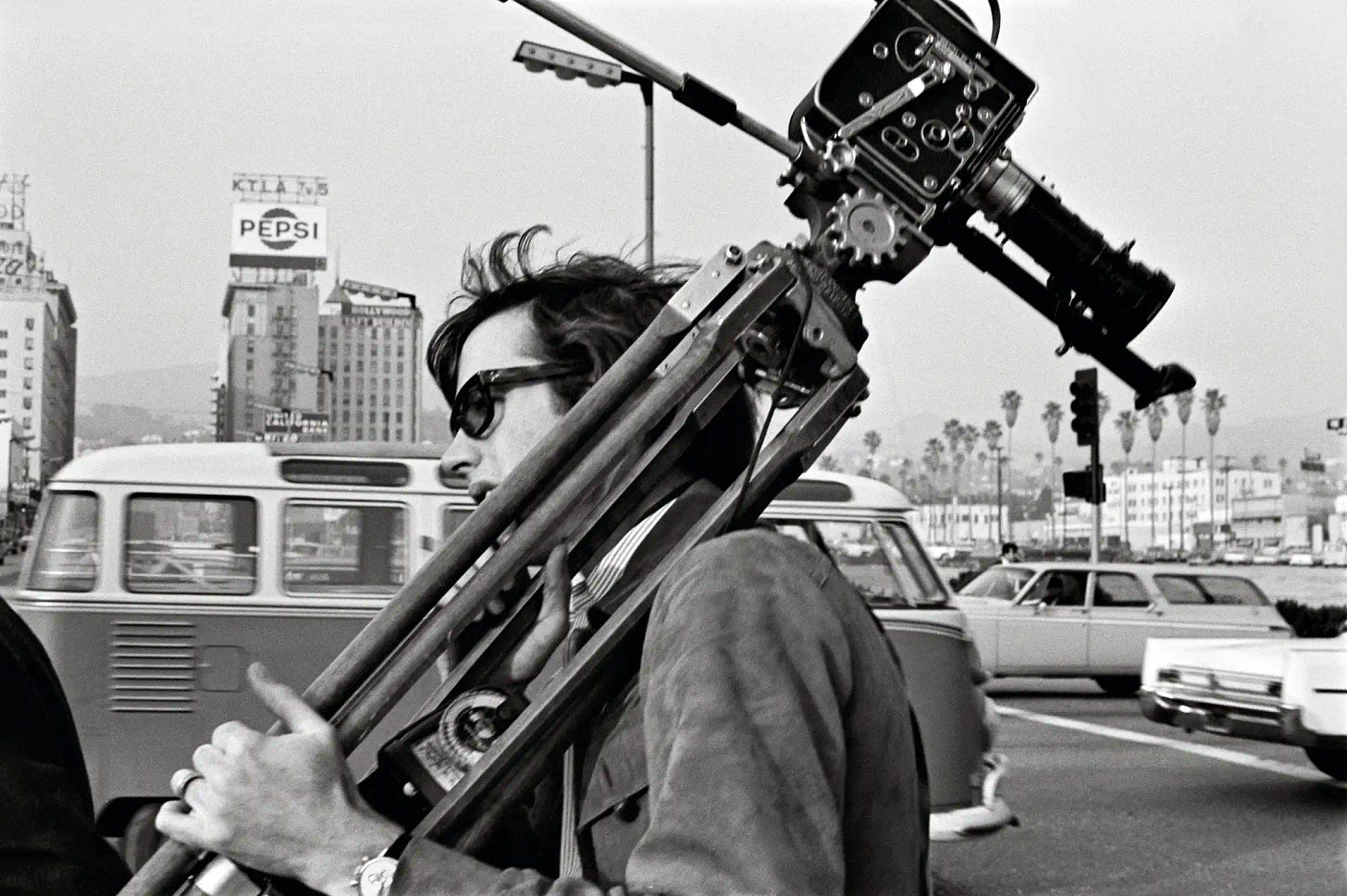Most Tuesdays, I walk a few miles from my apartment in Pasadena down into the main commercial strip of the city, through leafy streets and blankly hostile highway overpasses, to my local chain movie theater, the Regal Paseo. The Paseo is one of those theaters that has, for whatever reason, angered the gods of commerce and is thereby cursed to remain oddly empty despite a prime location on a busy pedestrian street in a prosperous suburb of the global center of the entertainment industry. And so, as I walk through the cavernous lobby, where sometimes no ticket taker can be bothered to appear, past the brimming popcorn machines and into a half-full-at-best auditorium, and as I slide discreetly into my back row solo seat to watch Black Bag or Sinners or The Amateur, I often find myself considering the decline and fall of the American film.
It’s not that I don’t find something to enjoy most of the time, and in fact the entertainment on offer does feel somewhat less disheartening than it did after the twin blows of Peak Marvel and the pandemic, when it seemed like no movie for adults would ever be made again. But everyone knows that something has shifted. The industry whose dark glamour was so often the basis for its own best output—for Sunset Boulevard, for Singin’ in the Rain, for Mulholland Drive—is now just another category in a whirling glop of Content, of a piece with streaming TV shows and YouTube essays and Minecraft. While movies and movie theaters will be with us for a while yet, for a hundred years or so the word Hollywood meant something, stood for the shimmering personification of the national unconscious. That era has come to a close.
In recent years, a spate of books has emerged that, in their own ways, serve as elegies to what Don DeLillo called the “filmed century,” both in their choice of subjects and in the way that they, like the great mavericks of New Hollywood, defy easy categorization. I think of A.S. Hamrah’s The Earth Dies Streaming, which makes a subtle and formidable art out of writing film criticism that frustrates studio marketing departments and hot take merchants alike, or of Bruce Wagner’s ROAR, his gonzo novel-as-biography of an imagined actor-director and his adventures with the very real celebrities of the twentieth century. And I think of Matthew Specktor’s new, wonderfully difficult to describe memoir/history/nonfiction novel The Golden Hour.
The Golden Hour is a sort of fantasia on two lives in and adjacent to the film industry: Specktor’s own life and that of his father Fred, a Hollywood agent. Beginning in the late 1950s, it follows Fred as he finds employment first with MCA, headed by Lew Wasserman, the dark prince of the old-school movie moguls, then with William Morris, and eventually as one of the first dozen employees of Creative Artists Agency. CAA and its inscrutable founder Michael Ovitz ride the shifting tides of ‘70s Hollywood all the way to the top, and Fred becomes a rich and powerful man. Soon Matthew enters the scene, and the book begins to encompass recollections of his celebrity-studded childhood, young manhood at CAA, and quest to define himself in adulthood, all the while continuing to weave in scenes from both his parents’ lives and the larger drama playing out behind all of them: the continued conglomeration and corporatization of the industry.
A history of Hollywood told through its talent agencies may not sound like the most immediately glamorous proposition, but Wasserman and Ovitz, in Specktor’s hands, assume something of the tragedy and grandeur of Shakespearean kings. Though their biographies are similar— both were born to lower-middle-class Jewish families, both worked their way up from the bottoms of their respective companies to become the most feared and respected men in entertainment— they come to represent the contrasts between the early twentieth century and the late. The ruthless, domineering Wasserman pioneers new ways of consolidating talent and monopolizing business, but he’s still the king of one town and one industry only; a figure out of James Ellroy’s Los Angeles, all crooked land deals, cricket sweaters, and big cigars. Ovitz is colder, sphinxlike. He doesn’t share a corner booth at Chasen’s with mobsters and movie stars, he flies a private jet to Tokyo fourteen times in one month and brokers the sale of MCA/Universal to a Japanese conglomerate via a lengthy, calculated performance of Lady Murasaki-esque tact and subtlety. He grasps for more money, more power, bigger deals because — why, exactly? Some mute compulsion, some quiet and sinister machine within that he doesn’t understand, just listens to. CAA grows out of the rough-and-tumble, freewheeling era of Bonnie and Clyde and Easy Rider to become a gleaming glass Reaganite behemoth, trading in star power the way Sherman McCoy trades in junk bonds. By the time Matthew Specktor grows up and makes his way into the industry himself, it’s not Wasserman’s world any more, it’s Ovitz’s. And by the time the book concludes, Ovitz’s world is gone too, replaced by Amazon and Apple and Netflix.
But what makes this story of the rise and fall of an industry so effective in The Golden Hour is that it largely occurs in the background. As in Proust or Powell (though in many fewer pages), vast changes happen over the course of a lifetime, a little at a time. And that lifetime consists of an accumulation of small moments and memories which, in their historical context, take on the oneiric glow of Super 8 film. Matthew seeing Apocalypse Now on acid. Blue Velvet in a decaying opera house in the eerie New England night. Brief encounters with Dustin Hoffman, Joan Didion, Marlon Brando. Frustrated ambitions and dead-end jobs. Portraits of his mother, a passionate lover of literature and an alcoholic would-be screenwriter, and his mentor, who dies young and whose ebullience and kindness come through even in the single short chapter in which he appears. All of life’s little tragedies and triumphs and banalities, punctuated by brief moments in which an encounter with a film or a novel takes you unexpectedly, blissfully out of yourself.
That this formula works instead of feeling like all those other “luminous” and “lyrical” and deadly fucking boring memoirs that clutter display tables at bookstores can be attributed to Specktor’s supremely tuned and rhythmic present-tense prose style, which has an insistent forward beat that recalls the great masters of the middle of the century. With the caveat that this sort of writing is always rather difficult to excerpt and relies more on a mood built and sustained over pages rather than sentences, here’s a taste, from a sequence following Wasserman, cruising down Sunset:
The DOJ hated the Paramount library deal, and they’ll hate this one, also, because MCA owns too much already, but it isn’t really even about “ownership.” When he calls himself a paper pusher—“I’m just a humble paper pusher” is what he tells interviewers who ask him how he does it—he isn’t being sarcastic or modest. The world is paper, and all he does is arrange himself among its many symbols, the better to ratify reality as dream.
West, he rides, west, west, the Bentley’s tires gliding down wet asphalt. His movement through the world is just like anyone else’s. He knows, as he rides in this cool, quiet car with just the creaking of his body and the armature of his thoughts for company, that you can structure your life the way you structure a deal, and once you’ve done so everything around you opens up just like a flower, and it is as if you are an artist after all.
You see what I mean: a little bit Ellroy, a little bit Fitzgerald, a little bit Bellow, and very Hollywood. Though everything The Golden Hour describes really happened, it is not nonfiction, exactly. It ranges freely between characters, inventing conversations, motivations, and inner monologues. In that way, it feels almost like a throwback, or a way not taken. Back in the late 00s, as I understand it, there was a lot of talk about the emergence of a new form. It was the era of Reality Hunger, of early alt-lit, of not-yet-curdled excitement about the social media age. Something was coming, they said, that would marry the blunt force of reality to the imaginative capabilities of the novel. Those predictions feel a little bit silly in retrospect; the novel has been declared irrelevant many times and has proven resilient. But The Golden Hour does feel like something that may have emerged, had the prose work of some length continued on that path.
It is the height of cliche to describe a book so preoccupied with film as feeling like a film itself. And yet in the case of The Golden Hour it is true and not in the depressing “written like a screenplay with descriptions” way that plagues many modern books, but in expert use of the cut, the juxtaposition, the withholding of information, and the montage. Often it will diverge from the story of the Specktor clan for a chapter or two to follow peripheral figures; we enter into the scruffy office of the screenwriters of Bonnie and Clyde, onto a transatlantic flight with an aged and reflective James Baldwin, who Matthew studies under in a college fiction workshop, even to a screening of The Jungle Book with, of all people, Mohammed Atta (in a misstep that I’ll chalk up to a difference in generational sensibilities, that one felt a little less like a daring formal innovation to me and a little more like a cutaway gag from Family Guy). These digressions, as well as the Ovitz-Wasserman chapters of corporate intrigue, help give the book its widescreen, roving-eye feeling. I’ll toss another name in there to go with the aforementioned writers: in its rambling juxtaposition of big lives and little lives and its insistence on their equal weight, texture, and importance, it often brings to mind the films of Robert Altman, particularly Nashville. If you know me (most of you don’t, but whatever), you’ll know what a high compliment I consider this to be.
As for the movies themselves, Specktor ends the book in a pessimistic mood and I can’t say I blame him or that I disagree, really. The sun set on the golden hour, which I take to refer to the brief interregnum between the Wasserman and Ovitz eras, after the rigid studio system and before focus groups, algorithms, and AI, long ago. And yet, I can’t quite let it go. Sometimes I drive down into the city in the evening glow, in that peculiar quality of light found only in Southern California, and I feel as if I can see all the ghosts that surround me. Or I find myself at a packed evening at the New Beverly, or in a Burbank showing of the unfairly dumped Looney Tunes movie, full of animators there to support their friends and colleagues, or even alone with three or four other drifters in a rainy midweek screening in some run-down theater. In those moments, when the lights go down, I suddenly feel the same thrill that I felt as a child and I think: it can’t and won’t be a future of slop. Some people, somewhere will carry the spark forward.
Recently I was rereading Didion’s Slouching Towards Bethlehem and came across “I Can’t Get That Monster Out of My Mind,” her 1964 essay complaining about the state of American film. I scoffed at first, thinking she didn’t know how good she had it, but when I actually looked at the top films of the early sixties, most of the Hollywood output did seem aimless, bloated, and unmemorable and it was the underground and foreign films — 8½, Scorpio Rising, High and Low — that were ushering in the subtle shifts in the art form’s field of possibility that in a few years would erupt into a golden age. This is not to say that the same thing will happen again, only that there are always processes and changes underway that are unseen by us, and that art has always found a way to surprisingly, unexpectedly flourish, even under rapacious and unfeeling stewards who want to pacify and harness it, from the old popes and statesmen to the current tech moguls (I am unfairly making something of a strawman of Specktor here, who no doubt agrees. “Forms don’t die,” he says, “Only people, and civilizations are mortal.”).
Until those changes make themselves evident, we have The Golden Hour, which captures a few lives in an extraordinary time and place, which elegizes a period of daring and vivid popular art, and which ends in mid-sentence, because it knows that the story of that art is always unfinished and ongoing, and so is the eternal story of the relationship between father and son.






"but when I actually looked at the top films of the early sixties, most of the Hollywood output" ... I still think she didn’t know how good she had it.
The big budget stuff may have been bloated. The B-movie houses may have been making more interesting films. But I keep coming across all this solid Hollywood output from the early- to mid-1960s. It got retrospectively downplayed because it didn't follow the counterculture and may not have been as vital as the 1950s. Now it fails to fit the New Hollywood narrative. But it might be time for a revisionist history of mainstream 60s Hollywood. My guess is absolute numbers are not bad but more output means the ratio of good stuff may have been down.
This was terrific